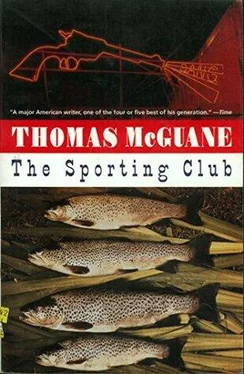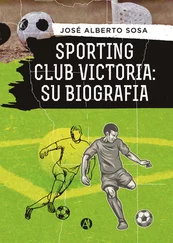“I am too.”
“Look, will you excuse me?”
“Of course.” Murray didn’t hear. He was chasing Janet, a great-thighed girl in pedal pushers. She ran enticingly from Murray who pursued, holding both hands in the air, one retaining the cigarette, the other the tortoiseshell glasses. Janet wasn’t making cases. And Quinn suspicioned Murray thought of orthodox domestic arrangements, sensibly made. It happened that Janet, Fortescue’s sole heir, was a highly successful engineer. Quinn entertained himself with visions of the arrangement, Murray advancing, Janet retreating; Janet advancing, Murray retreating; and before his eyes they did so, cutting and swerving in the dark lake sand, the still lake behind in the hot sun, throwing its single, wobbling flash of light. The golden lummox on the lifeguard tower gazed pitiless and hieratic upon the crescent of sunbathers with their towels and oils and paperback books. Across the lake, in deep bays of shadow, a canoe floated without movement. A fisherman cast peacefully with a rod that was a shiny filament at that distance. As Quinn walked along, the mothers rose up from towels, oiled and gleaming like seals, and glared into the sky before letting down again. Quinn browsed, hands behind, checking out the younger women, imagining giving them the old one-two; remembered newspaper accounts of infidelity among young marrieds and love rackets in the suburbs; why not shocking sex bash at exclusive trout club? One young woman lay before him, between him and the Teuton; she was even more golden than the latter with long brown legs and well-shaped feet; she lay upon her stomach, her face turned to one side, apparently asleep; the opening of her pretty mouth in that incandescently sunlit face seemed to Quinn the blackest stripe of pure void; and he stared at her until it made her sit up, return his look with hot distraction, and pour sun lotion down her cleavage; the oil emerged from under the bra of the bathing suit and sought her navel in slim, golden progress. Beside her was the child, an imperious infant who beat the sand with the flat of a little shovel and said, “Garbo! Garbo!” Quinn was embarrassed by her gaze. He snapped his fingers, consulted his watch, started off purposefully and fell. He pushed his hands through the sand as though sampling its warmth, hummed as if satisfied and, with beating face, looked over at the mother. Now she looked straight into him. The sun upon her and upon the infant ignited them savagely, and the lifeguard never moved. The woman’s eyes followed him, hung on him, as he got to his feet. He stood a moment, then went off. When he looked back, mother and child were as still as graven images and, like the lifeguard, didn’t move. Quinn made his way, his retreat, up the path, glancing back at the woman, the others too on the dark sand or wading in the lake’s sunlit, transparent margin.
* * *
Quinn thought: The hell with these unreckonable quantities. I’m a businessman. Besides, the lake was for women and children. If you didn’t want to shoot, drink or fish you were to have joined the Y. He went to the lodge, called the factory and talked to his manager. The manager assured him that things weren’t completely out of control but that they were tough, that’s all, tough. Material shortages were slowing production. This was Quinn’s clue. Material shortages in this case were always unnecessary, and Quinn saw that this trip was a mistake. This lapse was going to mean an inexcusable loss of orders. He saw now that the resonance and responsiveness of the company to his ministrations was matched by a mirror-image potential for decline. He couldn’t set it up and let it run as he had planned. It was like a bicycle and when he stopped pedaling, it stopped.
In his mind’s eye, a character that looked like Blind Pew was nailing up a sign that read BANKRUPT. By turns, Quinn holds his hammer for him, the sign, the nails, grows voluble and offers to buy him a drink.
* * *
Stanton was wearing the linen shorts of the first day.
“Been practicing in the gallery?” Quinn asked.
“Count on it. Air heavy with eventualities. Gin and tonic?”
“Just tonic would be fine. Hello, Janey.”
“Hello.”
“How are you…”
“She’s fine. Why no gin? Here.” He gave him the drink.
“It spoils the essential purity of the tonic.”
“That so.”
The porch was made like the room of a ship. The screened panels were held in place by half-round strips and brass screws; the strips had been imprecisely painted and the pores of the screen were filled for an uneven inch or so around their perimeters. Overhead, narrow varnished rafters divided the roof into regular strips of coarser wood. And above the screen were rolled canvas awnings. Quinn sat in one Hong Kong wicker chair, Janey in another; her arm hung in repose; her forefinger rested on the floor. Stanton strode on reliable, earth-gripper feet with their high tan arches and said, “Do you know, I didn’t fire Olson?” Quinn sensed a prepared question and tried to dodge it.
“What’s the new fellow’s name?”
“Earl something or something Earl. I forget. But I didn’t fire Olson and I didn’t hire what’s his name.”
“I talked to this guy actually. He used to be in the bait business—”
“I want to set the record straight about Olson—”
“—live bait.”
“The older members got hot around the collar and figured Olson had to go. And I didn’t like the sight of those two little deer. That also is for the record.”
“Don’t be coy. You made a move that was just extra stupid. Your speech the night we fished — it finished Olson.”
“James, you seem to have a backlog of bad feeling going for you—”
“You played up to the kind of stupidity we always hated, which is unedifying enough. But then this cutesie stuff after—” Stanton had to cut in.
“Be firm with me, father, I have sinned. My last confession was invalid.”
The new manager was at the door.
“We’re talking about you. What’s your name?”
“Earl Olive.” Olive came in and looked the place over like a demolitionist. He was wearing flamboyant cowboy clothes. “Just a couple questions,” he said, eyes sweeping over and around everything, including Janey, but seeing nothing to boost, settling on Stanton. “What do you know about these two deer?”
“Both dead.”
“Notice anything unusual?”
“Only you, Earl.”
“Have any clues? Or suspicions?” Earl pushed his Stetson back on his head with one finger under its frontmost edge.
“Yeah,” said Stanton, “Jack Olson or friends of Jack Olson.”
“He has an alibi,” said Olive.
“In the nature of what?”
“In the nature of drunk as a skunk,” Olive said. Quinn saw that this conversation was pleasant to Stanton in its contentiousness. “You know, Earl,” Stanton said, “Jack Olson was a real manager. He was a champ in his own way. Now around here the word is that you’re no more than a janitor.”
“You don’t say.”
“Well, don’t you have any feelings about that?”
“My only feelings is that these folks’t say I’m no more than a janitor might find themselves settling for a sight worse than that.” This was nearly the last thing he said. He was having a barbecue to celebrate his new job and had to be off. A few minutes after he left, Quinn was wondering about this barbecue and so were Stanton and Janey.
* * *
In the beginning, they watched from a distance. Earl Olive had a washtub full of coals on a metal stand and he stood before it in a huge white puff of a chef’s hat, turning meat. His friends sat on the stoop of his porch or swigged quart bottles of beer with their girl friends. One tanned and heavily lined man in an azure shirt that let you see through to his sleeveless undershirt and whose hair was as black as cinders and curled up into a sculptural pompadour, trapped a fat lady between a tree and his desperately pumping pelvis while Earl Olive, without watching him, yelled, “What the hell, Lucy? What the hell?” In front of the low fence that Olson had made were the cars and a few Harley-Davidson motorcycles with automobile-size tires, enormous saddles shaped like sections of a pie and more chrome fixtures than a motel bathroom. Earl Olive forked a piece of the cooking meat and held it out toward the trees, what looked like just trees, and said, “You wont some? Come own, you hungry? Say so and Earl Olive will feed you.” Beyond the party and before the trees, others could be discriminated in the shadows. This group included Fortescue, Krauss, Edith Terrell, Jensen, Van Duzen, Murdock, Spengler, Laidlaw and Scott. This was a different group from Earl Olive’s; for one thing, it was quieter and showed more solidarity; and they stood in dense, composite order, reminding Quinn of opening a can of sardines and finding, from left to right, a row of heads, a row of triangles, a row of diamonds, and a row of tails: unity. In contradistinction, Earl Olive’s group was disunited. Some were drinking, some talking, some trying to breed. Also, they were quite loud while the club group was very quiet. And they moved more; it was pointed out, for example, that at least one chap, the one in the see-through shirt, had a woman against a tree and was making a recognizably filthy motion against her. In fact, this same fellow yelled to Earl Olive that he was going to “do” her. The others in Earl’s group made a good deal of inchoate noise and Earl himself occasionally spoke directly to the club group, offering food, beer, or asking rhetorical questions. On the other hand, the group from the club said not one thing.
Читать дальше












